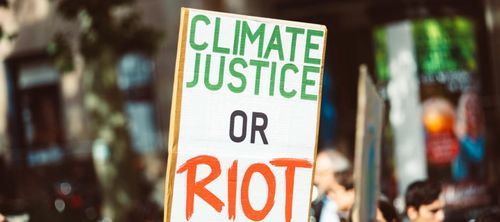Fueling the Fire

From marches and assemblies to public debate, emotions are pivotal in every part of climate activism. How can we take into account emotions in our communication and organizing? How can we foster resilient activism? How can we support each other in the fight for climate justice?
Emotions are central to how we think and act about climate change and global injustices: Think of how anger can spark a protest, how fear of repression creates doubts about whether to join, or how exhaustion can make even committed activists disengage. There are negative emotions around escalating climate collapse, police violence and the overwhelming work of organizing. But climate movements also provide spaces for active hope, joy, excitement, and pride. In fact, many climate groups try to actively attend to the depth of emotional experiences through check-ins, debriefings and regenerative practices.
Moreover, debates about climate injustice and the need for decolonization are deeply emotional – when we are confronted with historic and ongoing violences, when we work with collective trauma and collective guilt, and learn about action and inaction. Sharing reflections and experiences, this panel discussion aims to create a better understanding of what moves our activism, how we can use the potential of emotions, and how we can collectively deal with the negative emotional consequences of being at the forefront of fighting injustices.
About the speakers
Selçuk Balamir is a designer, researcher and organiser working on just transition. He has co-developed disobedient climate campaigns (Climate Games, Shell Must Fall) and co-initiated social housing cooperatives (NieuwLand, de Nieuwe Meent). His PhD in Cultural Analysis is on postcapitalist design and he’s currently doing a postdoc on repurposing fossil energy infrastructure in the just transition, and teaching about cultural strategies for decolonisation and decarbonisation.
Mitzi Jonelle Tan (she/they) is a writer and full-time climate justice activist and organizer from the Philippines. She is a Global Coordinator with the Fossil Fuel Non-Proliferation Treaty Initiative, the Project Lead of the Climate Justice Squad Fellowship, and one of the co-founders of Fridays for Future MAPA (Most Affected People and Areas). Mitzi is a strong voice on anti-imperialism, decolonization, and the intersectionality of the climate crisis. Through organizing, global solidarity, and cross-movement collaboration, she fights for systemic change.
Chihiro Geuzebroek Since 2009, Chihiro has been organizing actions, events, coalitions, and raising awareness of climate justice through grassroots activism and art. Chihiro previously made exhibitions about 100 years of resistance against Shell and the dreams of the Indigenous diaspora in the Netherlands, and she regularly performs her protest songs. She has put the fight against climate racism on the map in the Netherlands and is the co-founder of the Aralez Foundation, which focuses on decolonization through education, culture and protest.
Anna Aretha Sach is a researcher and activist. Her research focuses on understanding why people engage in climate activism and how they feel when engaging in collective action. For this, she works together with movements such as Extinction Rebellion and the International Climate Students Movement. She focuses on emotions, care, repression and intersectionality in activist movements. Anna participates herself in various protests and climate justice groups, currently mostly as an organizer with Debt for Climate Netherlands.
Harriët Bergman (moderator) is a philosopher, trainer and activist. She obtained her PhD at the University of Antwerp with her thesis ‘Privilege on a Burning Planet – emotions, narratives, strategies and radicality.’ She is working on an essay on violence for the ISVW, works at trainers collective Stroomversnellers and is secretary of Climate Obstruction NL. She gives workshops and writes about, amongst other things, political emotions, conflict resolution, green colonialism, ecofascism, organizing, climate obstruction and climate justice.